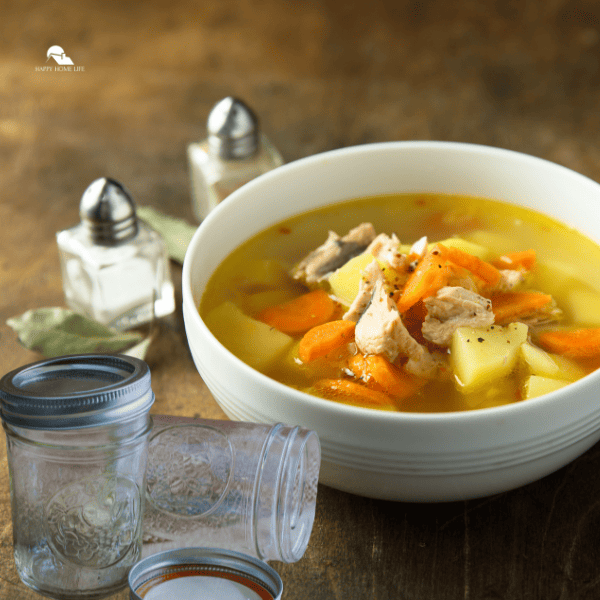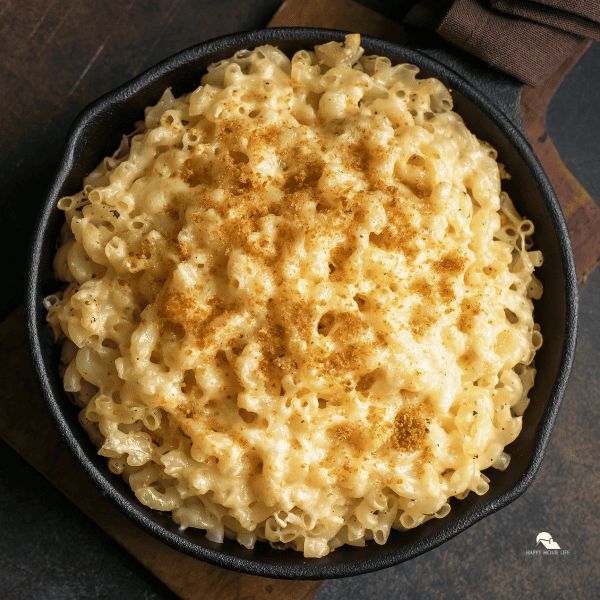Many people believe that thawing a turkey before cooking is essential to ensure even, safe cooking. However, this is a myth that can be debunked. It is possible to cook a frozen turkey without thawing it first, and here’s why.
The Possibility of Cooking a Frozen Turkey
Cooking a frozen turkey is possible and safe as long as proper precautions are taken. The key to successfully cooking a frozen turkey is to adjust the cooking time and temperature to accommodate the frozen state.
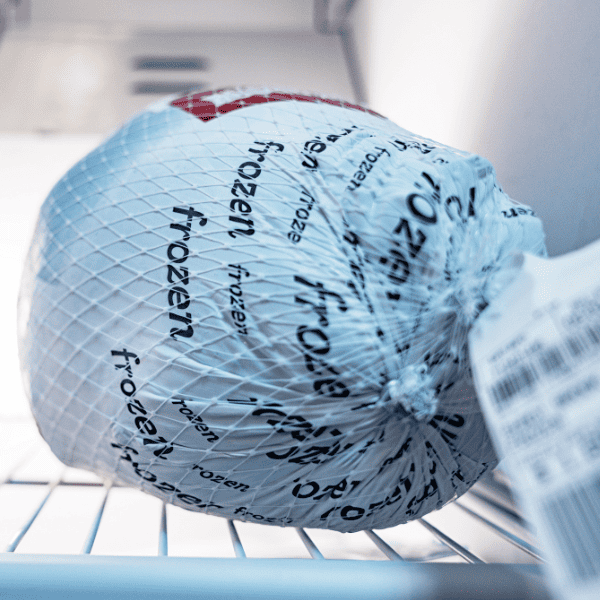
When cooking a frozen turkey, it is important to note that the cooking time will be longer than if the turkey were thawed. It is recommended to cook the turkey at a lower temperature for a longer period to ensure that it cooks thoroughly and reaches the desired internal temperature of 165°F (74°C).
To cook a frozen turkey, follow these steps:
- Preheat the oven to a lower temperature, around 325°F (163°C).
- Remove any plastic packaging or wrapping from the turkey.
- Place the frozen turkey on a rack in a roasting pan.
- Season the turkey with your preferred herbs, spices, and seasoning.
- Insert a meat thermometer into the thickest part of the turkey, making sure it doesn’t touch the bone.
- Cook the turkey, allowing extra cooking time as per the weight and frozen state.
- Monitor the internal temperature regularly, ensuring it reaches 165°F (74°C) before removing it from the oven.
- Let the turkey rest for about 20 minutes before carving and serving.
It is important to note that cooking a frozen turkey requires extra caution to ensure thorough cooking and to avoid any food safety risks.
By following these guidelines, you can confidently cook a frozen turkey without the need for thawing. Enjoy your delicious, hassle-free roasted turkey straight from the freezer!
How long does it take to cook a frozen turkey?
When it comes to cooking a frozen turkey, it’s important to plan ahead.
As a general rule of thumb, you can estimate about 50% more cooking time for a frozen turkey compared to a thawed turkey. For example, if a thawed turkey takes 3 hours to cook, a frozen one would likely take around 4.5 hours. However, it’s crucial to use a meat thermometer to accurately determine when your turkey is fully cooked, as cook times can vary depending on the size and type of your turkey.
To ensure safe and evenly cooked meat, it’s recommended to always follow the guidelines provided by the USDA or your turkey’s packaging. These guidelines will give you specific cooking times based on the weight of your turkey.
Remember, patience is key when cooking a frozen turkey. It may take a bit longer, but with proper planning and monitoring of internal temperature, you can still enjoy a delicious and safely cooked turkey.
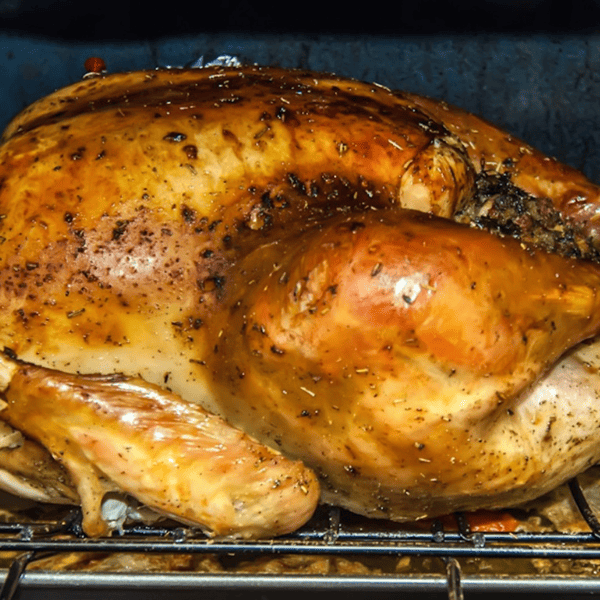
Is it better to thaw turkey or cook from frozen?
Thawing a turkey before cooking it seems like the logical thing to do, right? Well, not necessarily. It turns out that there are valid arguments for both thawing and cooking a turkey straight from the freezer.
Thawing a turkey allows for more even cooking and reduces the risk of undercooking or overcooking certain parts. It also allows you to brine the turkey, which can add extra flavor and moisture. Thawing can take several days, depending on the size of the turkey, and requires careful planning. You have to remember to take the turkey out of the freezer with enough time to fully thaw before cooking.
On the other hand, cooking a frozen turkey can save you time and effort. You don’t have to wait for the turkey to thaw, which means you can start cooking right away. Cooking a frozen turkey also reduces the risk of foodborne illnesses, as the bacteria present in the turkey can be killed during the cooking process.
Ultimately, the decision between thawing and cooking a frozen turkey comes down to personal preference and convenience. If you have the time and prefer a more traditional approach, thawing is the way to go. But if you’re in a hurry or don’t mind a little extra cooking time, cooking a frozen turkey can still yield delicious results.
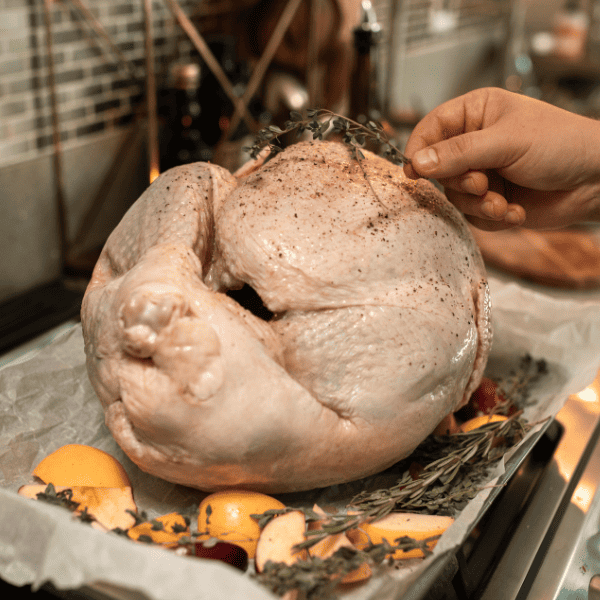
What happens if you don’t thaw a turkey?
When it comes to cooking a turkey, proper preparation is key. Thawing a frozen turkey before cooking is highly recommended for several reasons. If you don’t thaw your turkey, you may encounter some challenges.
First and foremost, not thawing a turkey can result in uneven cooking. When the turkey is frozen, the inside and outside will cook at different rates, leading to an undercooked or overcooked bird. This can be disappointing, especially if you’ve put effort into the other components of your Thanksgiving meal.
Cooking a frozen turkey can take significantly longer than cooking a thawed turkey. The frozen state of the turkey acts as an insulator, preventing the heat from reaching the center of the bird efficiently. As a result, you may end up with a dry and tough turkey, as the outer layers can become overcooked while waiting for the center to cook through.
Not thawing a turkey can also increase the risk of foodborne illness. The USDA recommends thawing a turkey in the refrigerator to maintain a safe temperature and prevent bacteria growth. When you cook a frozen turkey, the internal temperature may take longer to reach the safe minimum of 165°F, allowing bacteria to survive and potentially cause illness.
It is best to thaw your turkey before cooking it to ensure even cooking, retain moisture, and reduce the risk of foodborne illness. Taking the time to properly thaw your turkey will result in a delicious and safe Thanksgiving meal for you and your loved ones.
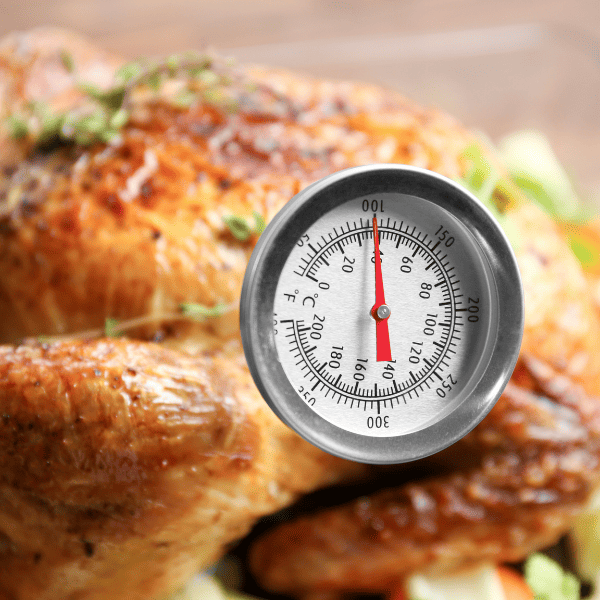
Can you cook a frozen turkey without thawing it?
The answer is yes, you can cook a frozen turkey without thawing it, but there are some important factors to consider.
Firstly, cooking a frozen turkey requires more time than a thawed turkey. The general rule of thumb is to allow an additional 50% of the cooking time for a frozen turkey. This means that if a thawed turkey takes 3 hours to cook, a frozen turkey of the same size will take approximately 4.5 hours.
Additionally, it’s crucial to ensure that the turkey is cooked to a safe internal temperature. The USDA recommends cooking a turkey to an internal temperature of 165°F (74°C) to kill any potential bacteria. Using a meat thermometer is essential to accurately measure the temperature.
Cooking a frozen turkey can result in a slightly different texture and flavor compared to a thawed turkey. The meat may be a bit drier, and the cooking process may take longer due to the ice crystals melting during cooking.
It’s important to note that while it is possible to cook a frozen turkey, it’s generally recommended to thaw the turkey first for the best results. Thawing allows for more even cooking and can prevent potential food safety risks.
Cooking a frozen turkey is possible, but it requires adjusting the cooking time and ensuring it reaches a safe internal temperature. If time allows, it’s typically best to thaw the turkey before cooking to achieve the desired texture and flavor.
Safety and Cooking Guidelines
Is it safe to cook a frozen turkey?
The USDA states that cooking a frozen turkey is safe as long as it is cooked to a safe internal temperature of 165°F (74°C) to kill any potential bacteria. Using a meat thermometer is crucial to accurately measure the temperature and ensure the turkey is thoroughly cooked.
However, it’s important to note that the cooking process for a frozen turkey may differ from a thawed turkey. The meat may be slightly drier, and the cooking time will be longer due to the ice crystals melting during cooking.
A cooking method that allows for longer cooking times is recommended, such as roasting at a lower temperature or using a slow cooker.
Adjusting cooking time for a frozen turkey
Cooking a frozen turkey requires more time than a thawed turkey. The general rule of thumb is to allow an additional 50% of the cooking time for a frozen turkey. For example, if a thawed turkey takes 3 hours to cook, a frozen turkey of the same size will take approximately 4.5 hours.
It’s important to monitor the turkey’s internal temperature throughout the cooking process to ensure it reaches the recommended safe temperature of 165°F (74°C). This may require periodic checks with a meat thermometer to ensure even cooking.
While it is possible to cook a frozen turkey, it is essential to adjust the cooking time and ensure it reaches a safe internal temperature. Thawing the turkey first is generally recommended for the best texture and flavor, but if time is limited, cooking a frozen turkey can be a viable option with proper care and attention to food safety guidelines.
Methods for Cooking a Frozen Turkey
Oven cooking method for a frozen turkey
If you find yourself with a frozen turkey and don’t have time to thaw it, you can still cook it safely with some adjustments. One method is to cook the turkey in the oven. Here’s how you can do it:
- Preheat the oven to 325°F (163°C).
- Remove the packaging from the frozen turkey. Place it on a rack in a roasting pan.
- Brush the turkey with melted butter or oil and season it with your desired herbs and spices.
- Cover the turkey loosely with aluminum foil to prevent excessive browning.
- Calculate the cooking time based on the weight of the frozen turkey. The general rule of thumb is to cook the turkey for 50% longer than a thawed turkey. For example, if a thawed turkey takes 3 hours to cook, a frozen turkey of the same weight will take approximately 4.5 hours.
- Insert a meat thermometer into the thickest part of the turkey, avoiding the bone. Cook the turkey until it reaches an internal temperature of 165°F (74°C).
- Remove the turkey from the oven and let it rest for about 20 minutes before carving.
Alternative cooking methods for a frozen turkey
If you don’t have access to an oven or prefer alternative cooking methods, there are a few options you can consider:
- Slow cooker: Place the frozen turkey in a slow cooker and cook it on low heat for an extended period. Be sure to monitor the internal temperature to ensure it reaches 165°F (74°C).
- Air fryer: If you have an air fryer large enough to accommodate a frozen turkey, you can use it to cook the turkey. Follow the manufacturer’s instructions for cooking times and temperatures.
- Deep frying: Some people opt to deep fry a frozen turkey. This method requires caution and careful adherence to safety guidelines, as cooking a frozen turkey in hot oil can be dangerous. Be sure to follow a reliable recipe and take necessary safety precautions.
Remember, regardless of the cooking method you choose, it is crucial to ensure the turkey reaches a safe internal temperature of 165°F (74°C) to prevent the risk of foodborne illnesses.
Whether you choose to cook it in the oven, slow cooker, air fryer, or deep fryer, always prioritize food safety and monitor the cooking process closely.
Tips for Cooking a Frozen Turkey
You can still safely cook it with a few adjustments. Cooking a frozen turkey requires some extra precautions to ensure it is cooked thoroughly and safely. Here are some important tips to keep in mind when cooking a frozen turkey without thawing it.
Importance of using a meat thermometer
When cooking a frozen turkey, it is crucial to use a meat thermometer to ensure it reaches the proper internal temperature. Insert the thermometer into the thickest part of the turkey, making sure to avoid the bone. The turkey should reach an internal temperature of 165°F (74°C) before it is considered safe to eat. This is necessary to prevent the risk of foodborne illnesses.
Proper handling and storage of a frozen turkey
Before cooking a frozen turkey, it is important to ensure it has been handled and stored properly to maintain its quality and safety. Here are a few guidelines to follow:
- Thawing options: If you have time, it is best to thaw the turkey in the refrigerator. However, if you are short on time, you can cook the turkey directly from frozen.
- Packaging: Remove the packaging from the frozen turkey before cooking. Make sure to discard any plastic or paper materials.
- Seasoning: Brush the turkey with melted butter or oil and season it with herbs and spices of your choice to enhance the flavor.
- Cooking time: When cooking a frozen turkey, it typically takes 50% longer to cook compared to a thawed turkey. Use the recommended cooking times as a guideline, but always rely on a meat thermometer to determine when the turkey is fully cooked.
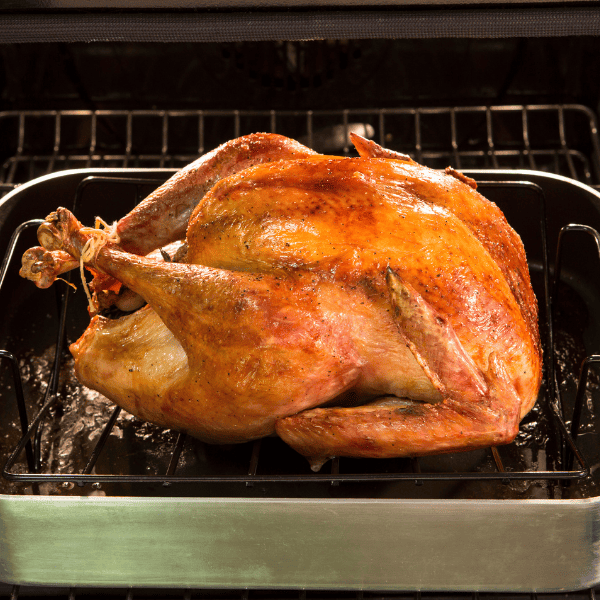
Benefits and Risks of Cooking a Frozen Turkey
Pros of cooking a frozen turkey
Cooking a frozen turkey without thawing it can be a convenient and time-saving option for many. Here are some benefits of this cooking method:
- No need for advance planning: When unexpected guests arrive or you simply forget to thaw the turkey in advance, cooking it directly from frozen eliminates the need for waiting hours or even days for it to defrost.
- Less risk of bacterial growth: Thawing a turkey improperly can increase the risk of bacterial growth, resulting in potential foodborne illnesses. Cooking a frozen turkey ensures that it reaches a safe internal temperature, reducing the risk of contamination.
- Moist and juicy meat: Some chefs argue that cooking a frozen turkey can yield tender and flavorful meat. As the turkey cooks slowly from its frozen state, the juices are locked in, resulting in a moist and delicious end product.
Potential risks and considerations
While cooking a frozen turkey can have its benefits, there are also some potential risks and considerations to keep in mind:
- Extended cooking time: Cooking a frozen turkey takes longer than thawed turkey. The additional cooking time is necessary to ensure that the turkey reaches the recommended internal temperature of 165°F (74°C) throughout.
- Uneven cooking: Due to the longer cooking time, there is a risk of the turkey cooking unevenly. To mitigate this, consider using a lower temperature and covering the turkey with foil to prevent excessive browning.
- Dry exterior: Because of the extended cooking time, there is a possibility that the outer layer of the turkey could become dry or overcooked. To avoid this, basting the turkey periodically and using a meat thermometer to monitor the internal temperature can help ensure a juicy and succulent outcome.
Overall, cooking a frozen turkey can be a viable option in certain situations. However, proper handling, cooking time adjustments, and regular use of a meat thermometer are essential to ensure a safe and delicious outcome.
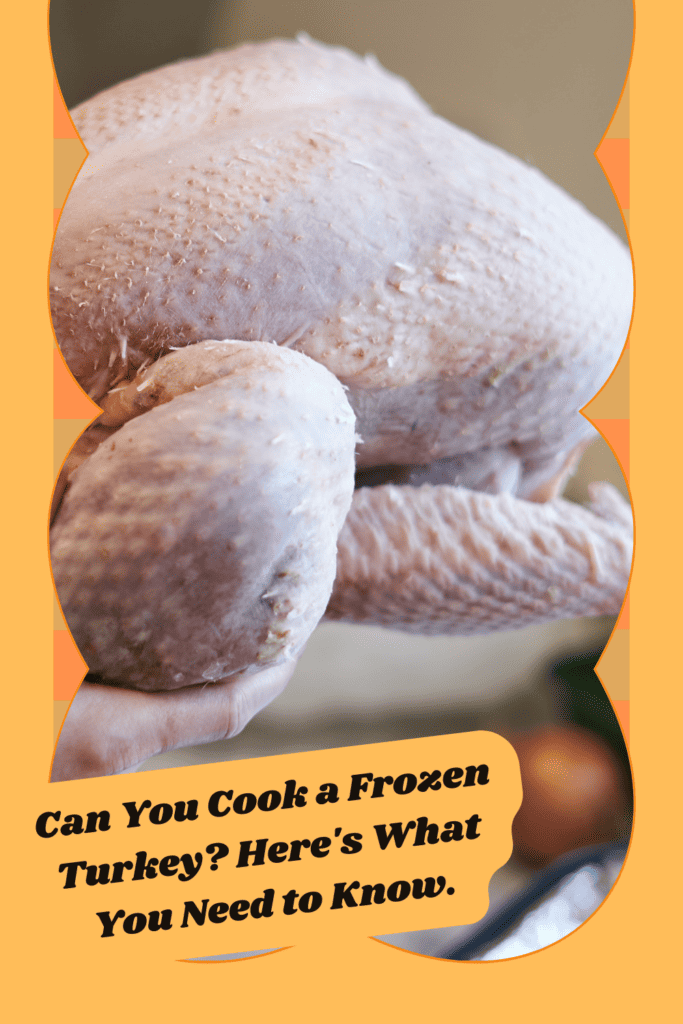
Conclusion
Cooking a frozen turkey without thawing it can be a convenient option for many, especially in situations where advance planning is not possible. It offers benefits such as no need for advance planning, reduced risk of bacterial growth, and the potential for moist and juicy meat. However, there are also potential risks and considerations to keep in mind, including extended cooking time, uneven cooking, and the possibility of a dry exterior.
Recap of the methods and guidelines for cooking a frozen turkey
When cooking a frozen turkey, it is important to follow these methods and guidelines:
- Start with a frozen turkey: Ensure your turkey is fully frozen before cooking.
- Adjust cooking time: Cooking a frozen turkey will require additional time compared to a thawed turkey. Make sure to account for this when planning your meal.
- Use a lower temperature: To prevent the outer layer from becoming dry, consider using a lower temperature and covering the turkey with foil to prevent excessive browning.
- Baste regularly: Basting the turkey periodically during cooking can help maintain moisture and prevent it from becoming dry.
- Use a meat thermometer: Regularly check the turkey’s internal temperature with a meat thermometer to ensure it reaches a safe temperature of 165°F (74°C) throughout.
Final thoughts and recommendations
Cooking a frozen turkey can be viable, but it requires proper handling and precautions to ensure a safe and delicious outcome. Following the recommended guidelines is essential, as adjusting cooking times accordingly, and monitoring the internal temperature using a meat thermometer.
It is advisable to consult reputable sources or seek professional advice for specific cooking instructions based on the size and type of your frozen turkey. You can enjoy a flavorful and safely cooked frozen turkey for your meal by taking these steps.

